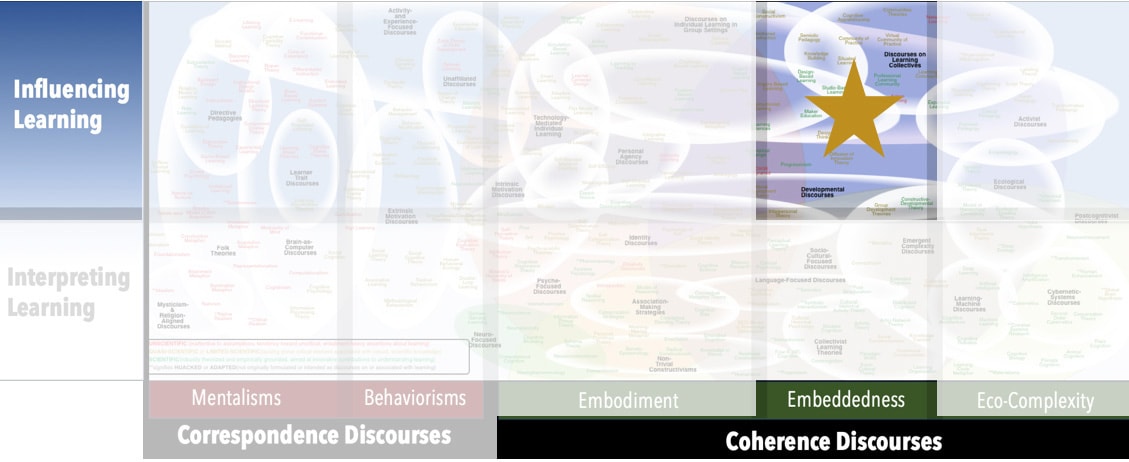Focus
Performed identities, as called forth by a situationPrincipal Metaphors
- Knowledge is … repertoire of performances
- Knowing is … acting a role
- Learner is … an actor
- Learning is … an emerging scene
- Teaching is … co-acting
Originated
1970sSynopsis
Script Theory rests on an analogy between patterns of human behaviors and written scripts. It postulates that human memory is based on episodes and events. The basic unit of Script Theory is a “scene” – that is, an emotionally impactful sequence of events and actions. A scene is seen to evoke a response that appears very much as though it was scripted – although always subject to revision as new scenes are experienced. Script Theory asserts that scripts enable humans to make inferences. Core notions of Script Theory include:- Knowledge Structure (Roger Schank, 1980s) – an elaboration of the notion of “schema” (see Schema Theory) to include defining elements of personal life episodes and experiences
- Conceptual Dependency Theory (Roger Schank, 1970s) – an attempt to describe both the structure of knowledge and the dynamics of cognition, grounded on the assertion that all conceptualizations can be defined in terms of actions of knowers on objects in their environments
- Contextual Dependency Theory (Roger Schank, 1970s) – an extension of Conceptual Dependency Theory, situated in the context of language understanding and focused on how humans represent meaning in sentences
- Collaboration Scripts (Ingo Kollar, Frank Fischer, Friedrich Hesse, 2000s) – guidelines on personal behavior and interpersonal interactions, intended to enhance learning within a collaboration of multiple learners. Often srongly reflective of Cooperative Learning structures, Collaborative Scripts specify and assign tasks and roles to participants. Examples include:
- ArgueGraph (Pierre Dillenbourg, Patrick Jermann, 2000s) – a computer-supported Collaborative Scriptintended to integrate individual, small-group, and whole-class learning. It begins by generating a “graph” of participants’ preferences and fluidly organizes groups and assigns roles according to similarities and differences across those positions.
- Scripted Cooperation (Angela O’Donnell, 1999) – a Collaborative Script intended for pairs of students who are learning from text. It involves parsing of material, paraphrasing, and active listening.
Commentary
Script Theory is based on a good analogy, but that’s all it really is. It is useful for interrupting commonsense assumptions around personal freedom and self-determination, highlighting that humans are coupled and situated beings … but, unlike theories of learning that develop the same notion, Script Theory doesn’t dig into why it might be. It permits a descriptive metaphor to masquerade as some sort of explanatory principle.Authors and/or Prominent Influences
Silvan Tompkins; Roger SchankStatus as a Theory of Learning
Script Theory is not a theory of learning.Status as a Theory of Teaching
Script Theory isn’t really a theory of teaching, but it has received a good deal of airplay in recent discussions of teacher–student relationships. The tactic of inviting teachers to consider the scripts that they might be acting out with one or more of their students has been shown, in some cases at least, to be a useful device for summoning healthier roles and reactions.Status as a Scientific Theory
Script Theory has become quite popular in some areas of education, especially in pre-service and in-service programs. However, as noted above, since it is little more than an analogy, it doesn’t meet the criteria of a scientific theory.Subdiscourses:
- ArgueGraph
- Collaboration Scripts
- Conceptual Dependency Theory
- Contextual Dependency Theory
- Knowledge Structure
- Scripted Cooperation
Map Location

Please cite this article as:
Davis, B., & Francis, K. (2024). “Script Theory” in Discourses on Learning in Education. https://learningdiscourses.com.
⇦ Back to Map
⇦ Back to List
